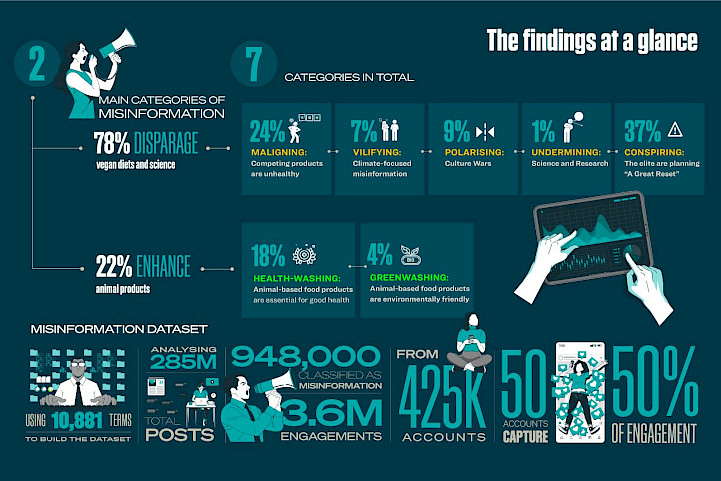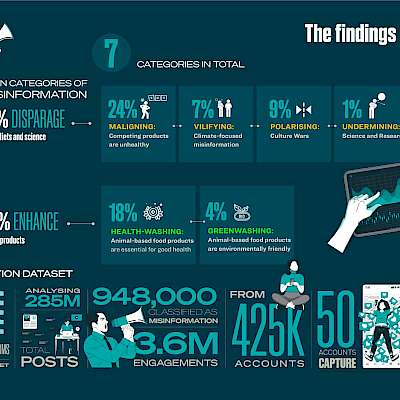As a movement working to accelerate the shift to more sustainable, healthier, and fairer diets, we are all too aware of the uphill battle this can be and the challenges we face in calling for an end to the current model of over-production and consumption of meat and dairy. Our latest report reveals the scale of one of those challenges: misinformation on social media.
By analysing a flood of conspiracy theories, junk science and aggressive pro-meat posts, we uncovered the key narratives and actors working online to undermine efforts to mitigate the harms of the current food system.
What we found
Our research uncovered almost a million posts (mainly from X, formerly Twitter, but also Reddit and blogs) spreading pro-meat and dairy misinformation over a 14-month period. 78% of these were seeking to ‘disparage’ climate and nutrition science as well as alternative proteins and vegan diets, whilst 22% focused on ‘enhancing’ the health and sustainability credentials of meat and dairy.

Within these two categories, seven clear misinformation narratives emerged:
- Conspiring: 37% of posts drew on conspiracies that the ‘elite’ are planning ‘A Great Reset’ which includes government control of land, forcing people to eat bugs and eliminating farmers.
- Maligning: 24% of posts sought to represent alternative proteins and products as unhealthy, labelling them ‘ultra-processed’, comparing them to dog-food or suggesting they cause ‘turbo-cancers’.
- Polarising: 9% of the misinformation was driving ‘culture war’ divides, sowing divisions by, for example, questioning the masculinity of men who choose plant-based diets.
- Vilifying: 7% of the dataset spread climate misinformation, either seeking to suggest alternative proteins are worse for the planet than conventional meat or suggesting climate change concerns about meat and dairy are part of a ‘climate hoax’.
- Undermining: 1% of the overall posts sought to undermine climate and nutrition science and research, for example attacking the findings of the EAT Lancet commission on sustainable diets, or the latest results of the Global Burden of Disease.
- Health-washing: 18% of the dataset focused on exaggerating, inflating or falsifying the health benefits of meat and dairy, suggesting diets like the ‘carnivore diet’ can cure depression or a host of medical issues.
- Greenwashing: 4% of posts were familiar greenwash attempts, suggesting meat and dairy production is sustainable and even that we need more cows to solve climate change.
Our research also investigated who is driving this misinformation, namely which accounts and posts have the most engagement and are connected to certain peaks in the narratives. We found that 50% of the engagement for all 1 million posts was connected to just 50 accounts. These accounts included notable far-right political and media personalities such as Tucker Carlson and Donald Trump Junior, as well as so-called ‘wellness’ or self-proclaimed medical experts.
Learnings for our movement
Whilst the purpose of the report wasn’t to discover if big meat and dairy players are driving this misinformation, we were able to track a number of the narratives to the industry. Drawing on previous investigations, for instance into the National Cattlemen Beef Association’s Masters of Beef Advocacy programme, the campaigns against alternative proteins by notorious US lobbyist Rick Berman or the UC Davis CLEAR Center’s ties to the livestock industry, we were able to highlight the ways in which industry misinformation is perpetuated on social media.
We know that misinformation online has real world implications, and that social media plays a role in exacerbating political polarisation. This leads to declining trust in institutions, science and democratic values: all things that are critical to our movement’s aim to bring about a more sustainable, healthy and fair food system.
We are already seeing how misinformation is used by politicians. Here in the UK the Prime Minister Rishi Sunak announced he would scrap plans for a non-existent meat tax. In the Netherlands, the recent election victor Geert Wilders (who has yet to form a government at the time of writing) is known for spreading racist, anti-immigrant misinformation connected to the Dutch nitrogen and farming policy debate. And in Italy, a recent ban on cultured meats and ‘meat-related’ terms was fuelled by misinformation surrounding alternative proteins.
This research should serve as a reminder, that we must prioritise evidence-led solutions, but also that it is in many ways the job of NGOs and civil society groups to communicate this critical climate and health science in a way that cuts through, be that to policy makers or the public. Now that we can better understand one of the challenges we face towards eating better, we can build our capacity to overcome it.
Read the full report.

